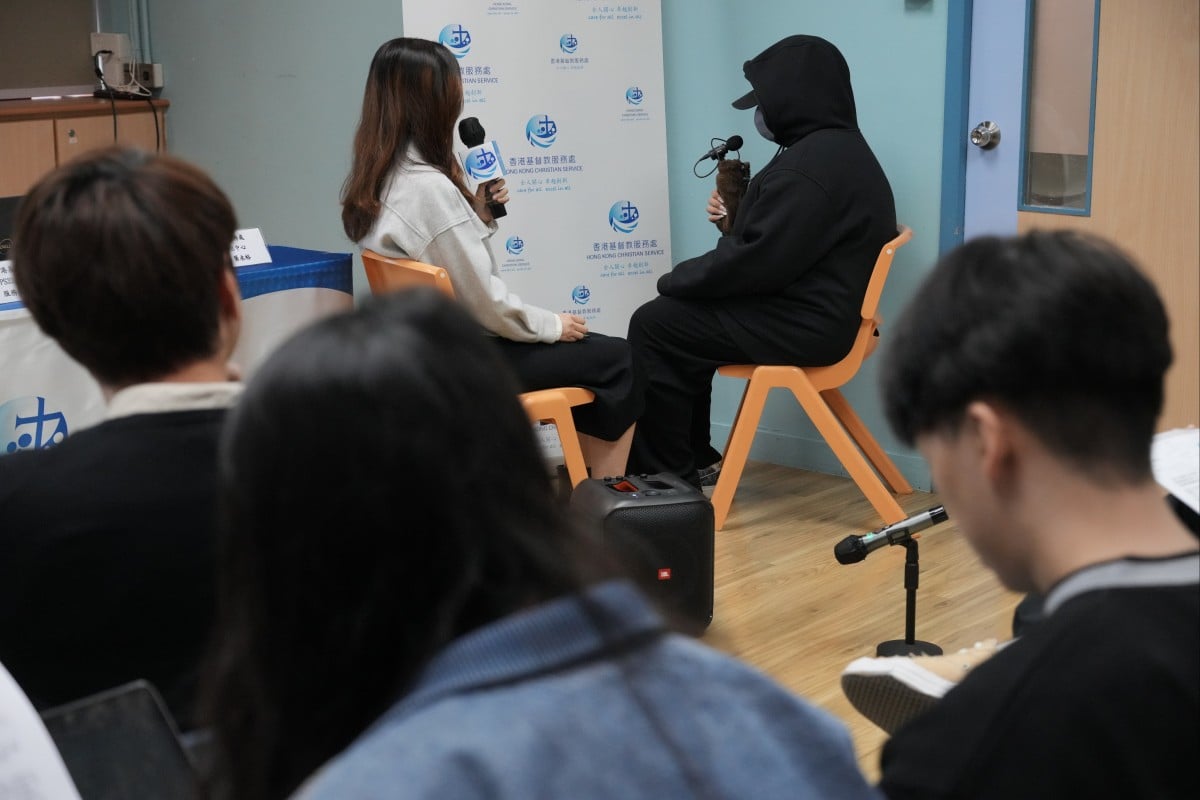
Deep Dive: Hong Kong’s fight against ‘space oil’ as the drug rises in popularity among teens
Government has classified the narcotic as a dangerous drug, meaning possession, trafficking could lead to lengthy prison sentences
 “Luna”, a 19-year-old former space oil user, talks about the drug’s effects during a press conference held by Hong Kong Christian Service. Photo: May Tse
“Luna”, a 19-year-old former space oil user, talks about the drug’s effects during a press conference held by Hong Kong Christian Service. Photo: May TseDeep Dive delves into hot issues in Hong Kong and mainland China. Our easy-to-read articles provide context to grasp what’s happening, while our questions help you craft informed responses. Check sample answers at the end of the page.
News: Hong Kong police arrest two teens on drug trafficking charges
-
Pair were arrested for suspected possession of ketamine and ‘space oil’ vape cartridges
-
The government has classified key ingredients used to make space oil as dangerous drugs to combat its rising use among teens
An 18-year-old man and a 15-year-old girl were arrested in Hong Kong earlier this month for suspected drug trafficking and possession after police seized narcotics worth about HK$278,000 (US$35,780), including ketamine and “space oil” vape cartridges.
They were arrested at a flat in Yau Ma Tei. Police discovered about 475 grams of suspected ketamine and 121 suspected vape cartridges containing liquid etomidate, a powerful anaesthetic.
It has become known in recent years as a common main ingredient in space oil, a drug that has become popular among youngsters. The narcotic is often used in e-cigarette capsules.
Police said the pair would face drug trafficking and possession charges. They would remain in custody as officers continued their investigations.
In another case, a 16-year-old boy was arrested on suspicion of producing and trafficking space oil worth HK$200,000. The arrest followed a raid on a suspected drug making premise inside a hotel room in North Point.
Hong Kong police increase patrols at Kwun Tong Promenade to curb teen crimes
Space oil does not have a set formula. Drug dealers commonly mix etomidate with other illegal narcotics, such as cannabis and ketamine. They may also mix it with flavoured glycerine – a colourless, odourless liquid – to be used in e-cigarette capsules.
The government has classified etomidate and other key ingredients in space oil as dangerous drugs. This puts them in the same category as cocaine. The move is meant to combat its rising use among teens.
Owning or consuming chemicals listed under the Dangerous Drugs Ordinance is punishable by up to seven years in prison and a maximum fine of HK$1 million. Those caught trafficking in the listed substances could face life in prison and a HK$5 million fine.
Police officers have been carrying test kits that can detect traces of etomidate since mid-January. It is part of efforts to combat the substance’s growing popularity.
Police recorded 278 space oil-related arrests last year, up from just eight in 2023, with 61 arrestees under 21.
Repeated use of the substance poses a danger to users’ physical and mental health.
It can lead to conditions such as addiction, memory loss, seizures, loss of consciousness and even death.
Staff writers
Question prompts
1. What is the maximum penalty for trafficking substances listed as dangerous chemicals under Hong Kong’s Dangerous Drug Ordinance?
A. Seven years in prison and a HK$1 million fine
B. 10 years in prison and a HK$2 million fine
C. Life in prison and a HK$5 million fine
D. 20 years in prison and a HK$3 million fine
2. List TWO measures the Hong Kong government and police have taken to fight the increasing popularity of space oil.
3. What are the consequences of using dangerous drugs such as space oil? Explain using News and your own knowledge.
Photo
Question prompts
1. According to News, why might it be hard for police to identify when people are consuming space oil?
2. Using News and Glossary, explain why space oil can be especially harmful for young people.
Issue: Hong Kong must address underlying reasons for ‘space oil’ usage, experts say
-
Social worker says the legislative ban may discourage people with drug problems from seeking help
-
Some young users said the drug helped to relieve stress over emotional or family issues
The Boys’ and Girls’ Clubs Association of Hong Kong reported that among the 100 young people its social workers had approached, some had used or were still using “space oil”, with the youngest being 12. A few had even trafficked the drug.
A February survey by the NGO involving 15 young people revealed that about 30 per cent intended to continue using space oil, and nearly all of the group believed they could still obtain it. Respondents said they used the drug to relieve stress and experience a “high”.
The NGO cited an 18-year-old who doubted his ability to quit despite the coming legal changes. He first tried cocaine when he was 15 after leaving his broken home and later turned to space oil after addiction treatment.
Meanwhile, a 24-year-old shared that family issues led him to go to bars, where friends introduced him to the drug. He used it to manage his financial and emotional stress but quit after his girlfriend’s hospitalisation and arrest. He has since been off the drug for nearly a year.
The NGO urged Hong Kong authorities to address the underlying reasons young people turn to space oil, such as troubled family relationships.
David Ng Ka-shun, executive director of the Community Drug Advisory Council, recommended a three-tier intervention mechanism to support users based on their risk levels.
Invent technology to help young people avoid drugs – what would it be?
He said that under the mechanism, drug users could be divided into different risk levels and offered the necessary interventions at each stage.
Claudia Ng Wai-see of the Hong Kong Christian Service warned that following the ban, persistent users might become more reclusive to conceal their activities, stressing the need for professional intervention, which Ng agreed with.
“A legislative ban may deter casual users,” Wong noted. “But it won’t help those who feel they need drugs. We must listen to their struggles, such as bullying or abuse.”
Prolonged usage of space oil could also hurt people physically. Anaesthesiologist Chow Yu-fat warned that some chemicals found in the drug were intended as animal anaesthetics and posed risks when abused.
“Abuse of medicines affecting the central nervous system causes adverse effects and potential addiction,” Chow said.
Staff writers
Question prompts
1. According to the Boys’ and Girls’ Clubs Association, what reason did young people give for using space oil?
(1) It improved their concentration.
(2) It relieved their stress.
(3) They wanted to experience a “high”.
(4) It improved their social skills.
A. (1), (2) only
B. (1), (3) only
C. (2), (3) only
D. (3), (4) only
2. List ONE recommendation David Ng made to help tackle the issue of young people using “space oil”.
3. What measures could authorities, families and schools take to discourage the use of space oil? Explain using News, Issue and your own knowledge.
Photo
Question prompts
1. What is depicted in this picture, and what message is it trying to convey?
2. How effectively do you think this image can help prevent Hong Kong youth from using space oil? Please explain your response using News, a glossary and your own knowledge.
Glossary
-
narcotic: a drug that affects a person’s mood or behaviour and that can be addictive
-
etomidate: a powerful drug that has become known in recent years as a common main ingredient in “space oil”, a recreational drug that has rapidly become popular among youngsters
-
anaesthetic: a substance that reduces one’s sensitivity to pain, typically used during medical procedures to numb sensation
-
intervention: an attempt by one or many people – usually family and friends – to get someone to seek professional help
Sample answers
News
1. C
2. Police officers now carry test kits that can detect traces of etomidate in substances and they have classified key ingredients in space oil as dangerous drugs, meaning that possessing or trafficking them can be punished with hefty fines and long jail sentences.
3. Using dangerous drugs such as space oil can have severe consequences. Legally, individuals caught possessing the drug face up to seven years in prison and a maximum fine of HK$1 million, while those involved in trafficking could face life imprisonment and a HK$5 million fine. Additionally, there are serious health risks, including addiction, memory loss, seizures, loss of consciousness, and even death. Being involved in drug-related activities can also lead to arrest, a criminal record, and other social consequences, further impacting a person’s future.
Photo
1. This is an advertisement warning people, especially young ones, about the dangers of space oil. It notes that the main ingredient, etomidate, is classified as a dangerous drug under the law. The visual of a person falling into a dark vortex reinforces the idea that getting involved with space oil leads to harmful consequences.
2. This advertisement may be somewhat effective in raising awareness about the dangers of the drug through its use of striking visuals and bold text to capture attention. The image of someone being sucked into a vortex effectively symbolises the dangerous and consuming nature of drug abuse. However, its success may depend on the audience’s willingness to engage with the message. While the imagery may resonate with some, more educational programmes, peer support systems–– and addressing underlying social issues may be necessary to create lasting behavioural change.
Issue
1. C
2. He proposed a mechanism with three tiers to assist users based on their risk levels.
3. Authorities could launch awareness campaigns in schools to educate students about the dangers of space oil. Educators should provide emotional support through counselling and mentorship programmes to help at-risk youth manage stress in healthier ways. Families must maintain open communication and offer positive reinforcement to build trust and reduce feelings of isolation. Additionally, authorities could create more accessible community programmes that engage youth in sports, arts or volunteer work, offering positive stress outlets and socialisation opportunities. By combining education, support and positive engagement, we can address the root causes of youth drug use and reduce its prevalence.
Photo
1. It can be used in e-cigarettes, making it difficult for police to determine if people are smoking nicotine or space oil.
2. Police officers started carrying test kits that can detect traces of etomidate.